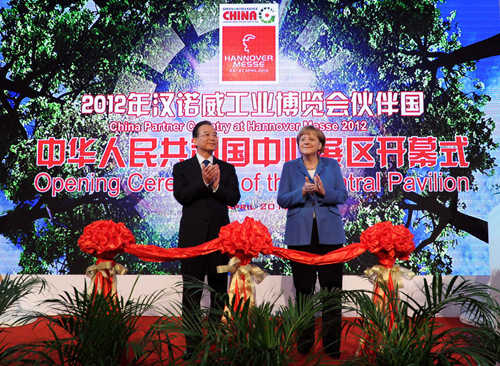|
 |
|
COMMON LINK: Chinese Premier Wen Jiabao and German Chancellor Angela Merkel attend the opening ceremony of the Chinese central pavilion at the Hannover Messe 2012 on April 23 in Hannover, Germany (RAO AIMIN) |
This year is crucial for both China and Europe. The former needs to realize its economic transformation and steady development, and the latter has to deal with the sovereign debt crisis. Closer trade and economic ties will help both sides to fulfill their tasks more easily.
From April 20 to 27, Chinese Premier Wen Jiabao visited Iceland, Sweden and Poland, while attending the Hannover Messe 2012 in Germany. Experts believed that this is an important trip for China and Europe to boost their trade and economic cooperation. And cooperation on green economy will be a hotspot of future cooperation.
Last year, many EU members, like Iceland, Spain, Portugal, Greece and Italy, were stuck in the sovereign debt swamp. Now the crisis is still far from over. Experts said both China and Europe have realized that enhancing practical cooperation is a reliable way to overcome the crisis.
Feng Zhongping, Director of the Institute of European Studies at the China Institutes of Contemporary International Relations (CICIR), said that thanks to EU members' joint efforts of strengthening fiscal discipline, the euro zone has passed the key period of the first quarter of 2012, and market confidence has recovered. But the crisis is still hovering over the continent.
"There is some pessimistic tone about Europe and the euro zone. Some even predict that the EU will fall apart. In spite of Europe's actual difficulties, we still trust that Europe will get past the crisis, and the EU will maintain its important influence on world events," Feng said. "We are willing to strengthen the Sino-EU comprehensive strategic partnership."
Wen said in a speech at the Hannover Messe 2012 that the financial crisis is still going on. He suggested putting more resources to spur the development of the real economy, and create an environment conducive to job creation and the development of the real economy. He also urged efforts to vigorously push for innovation-based growth while calling for openness and cooperation.
Shen Jiru, a researcher with the Institute of World Economics and Politics under the Chinese Academy of Social Sciences (CASS), said, "It is still uncertain whether or not the domino effect of the debt crisis will occur in the EU, which is of a similar size to the U.S. economy." He warned that European nations face a stronger challenge than the United States, because EU nations' sovereign debts are owed to banks of other countries, while the United States can actually transfer its financial crisis to other nations by releasing more dollars.
He said that since China and the EU have established a close economic and trade relationship, the EU debt crisis will definitely influence China. "Premier Wen's recent trip is also based on the target of coping with the challenge together by strengthening their complementary cooperation," said Shen. According to statistics from Chinese Customs, the Sino-EU trade volume reached $567.21 billion in 2011, increasing 18.3 percent from the year before. Now the EU is China's biggest trade partner and importer.
The EU is also an important investment market and technology exporter to China. Professor Zhao Huaipu with China Foreign Affairs University said that strengthened cooperation will help Europe get through the current financial crisis, and China can urge Europe to open its market to China, recognize China's market economy status, and expand hi-tech exports to China so as to promote investment.
| 